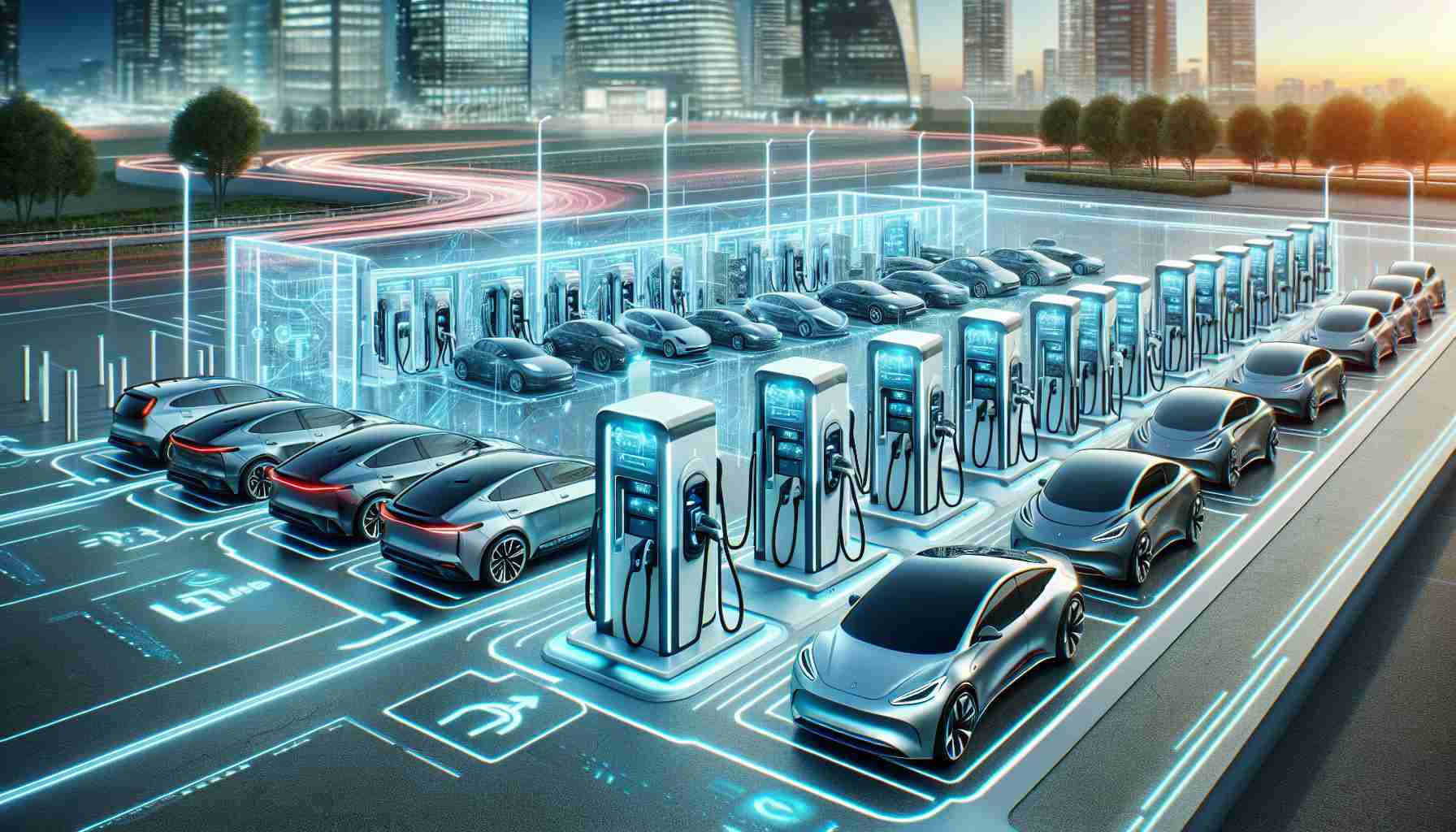In a game-changing move for the electric vehicle (EV) landscape in China, Xpeng is dramatically increasing its charging infrastructure. With over 2,000 charging stations and more than 10,000 chargers currently in operation, Xpeng recently announced a groundbreaking partnership with BP Pulse. This collaboration will enhance access to a combined network exceeding 30,000 charging terminals across 420 cities.
Under this new agreement, customers from both Xpeng and BP Pulse will benefit, as the two companies aim for deeper synergy in various sectors including energy storage, photovoltaics, and marketing. They are also set to initiate pilot projects in key urban areas to establish ultra-fast charging networks, maximizing efficiency through shared facilities.
In an earlier development, Xpeng partnered with Volkswagen to share access to a substantial network of 20,000 charging piles, further expanding the reach and capabilities available to EV users. This partnership will not only enhance service availability but could also lead to the creation of co-branded super-fast charging stations in the future.
Looking ahead, Xpeng plans to extend its charging network internationally by 2025, with projects anticipated in regions like Asia, Europe, and Australia. This rapid expansion signifies Xpeng’s strategic vision to solidify its position as a leader in the global EV market. With Volkswagen’s investment of $700 million and ongoing collaborations, the future looks promising for Xpeng and its customers.
Xpeng’s Expanding Charging Infrastructure: A Leap Toward Sustainable Mobility
Xpeng Motors, a Chinese electric vehicle (EV) manufacturer, is reshaping the EV ecosystem with its ambitious plans to expand charging infrastructure significantly. Through robust partnerships, notably with BP Pulse and Volkswagen, Xpeng is set to revolutionize the accessibility and efficiency of EV charging across multiple regions. As Xpeng announces its expansion of over 30,000 charging terminals across 420 cities and goals to extend its reach internationally by 2025, the implications of this step extend far beyond just the automotive industry.
The impact of increased charging infrastructure on the environment is profound. With a rising number of charging stations, more consumers are incentivized to shift from fossil fuel-powered vehicles to electric ones. The transportation sector is one of the largest contributors to greenhouse gas emissions, and by facilitating the transition to EVs, Xpeng plays a critical role in reducing overall carbon footprints, improving air quality, and mitigating climate change. Enhanced accessibility to charging stations can lead to a decline in reliance on gasoline and diesel, further spurring a global movement toward sustainable energy sources.
Humanity stands to gain immensely from Xpeng’s initiative. As more urban areas develop robust charging networks, it enables a broader demographic of people to adopt electric vehicles, particularly in densely populated cities where pollution levels are often high. This shift not only promotes healthier living conditions but also bridges the gap between technological advancement and environmental stewardship. Additionally, by making charging more accessible, Xpeng encourages wider acceptance and normalization of EVs, paving the way for a future where sustainable transportation is the standard.
From an economic perspective, Xpeng’s expansion initiative could stimulate job creation and foster innovations within the clean energy sector. The collaboration with major companies like BP Pulse allows for a pooling of resources and expertise, which can lead to the development of new technologies in energy storage and photovoltaics. As Xpeng and its partners explore avenues like ultra-fast charging, there lies potential for advancements that could lower charging costs and improve efficiency, thus appealing to cost-conscious consumers and businesses alike.
Looking ahead, the future of humanity with such advancements points toward a more sustainable and interconnected world. As Xpeng extends its influence into international markets, it could inspire other countries to invest in their electric infrastructure, translating to global reductions in carbon emissions. Furthermore, with shared charging facilities and collaborative projects, this model could foster cooperation among nations, uniting efforts to tackle climate change challenges collectively.
In summary, Xpeng’s strategic initiatives to enhance its charging infrastructure are not only pivotal for the automotive industry but also hold substantial implications for the environment, public health, economic growth, and international relations. As society stands at the crossroads of technological advancement and ecological responsibility, such measures taken by leading companies could very well shape a sustainable future for humanity.
Powering the Future: How Xpeng is Revolutionizing EV Charging in China and Beyond
Introduction
Xpeng, a prominent player in the electric vehicle (EV) market in China, is making significant strides in expanding its charging infrastructure, a critical factor in the success of EV adoption. The company’s innovative partnerships are set to redefine the landscape of electric vehicle charging, ensuring convenient access for users and promoting greener transportation solutions.
Xpeng’s Impressive Charging Network Expansion
Currently operating over 2,000 charging stations with more than 10,000 chargers, Xpeng has recently partnered with BP Pulse to further broaden its services. This collaboration aims to create a comprehensive charging network that will exceed 30,000 charging terminals across 420 cities. This joint venture reflects a strategic move to provide seamless access to charging solutions, benefiting both Xpeng and BP Pulse customers.
Key Features of the Partnership
1. Ultra-Fast Charging Initiatives: The partnership will see pilot projects in key urban centers aimed at developing ultra-fast charging networks, optimizing the user experience by sharing charging facilities.
2. Diverse Energy Solutions: Xpeng and BP Pulse plan to explore synergies in sectors like energy storage, photovoltaics, and marketing, making charging solutions not only more accessible but also sustainable.
Collaboration with Volkswagen
In addition to its partnership with BP, Xpeng’s earlier collaboration with Volkswagen allows access to 20,000 charging piles, further strengthening the EV infrastructure. This partnership is anticipated to lead to the development of co-branded super-fast charging stations, enhancing service availability and convenience for EV users.
Future Expansion Plans
Looking towards 2025, Xpeng has ambitious plans to expand its charging network internationally, targeting regions such as Asia, Europe, and Australia. This expansion is crucial for establishing Xpeng as a leader in the global EV market. With Volkswagen’s substantial investment of $700 million in this partnership, Xpeng’s trajectory appears promising.
Pros and Cons of Xpeng’s Charging Infrastructure
Pros:
– Extensive Network: The growth of charging stations will significantly increase convenience for EV owners.
– Partnerships: Collaborations with major companies like BP and Volkswagen enhance service offerings and boost credibility.
– Innovative Solutions: Focus on ultra-fast charging and energy solutions showcases Xpeng’s commitment to sustainable practices.
Cons:
– Initial Costs: Expansion may require significant upfront investment and logistical coordination.
– Market Competition: Xpeng faces competition from other EV manufacturers and charging network providers, which may impact market share.
Pricing and Compatibility
While specific pricing details for using Xpeng and BP Pulse charging stations have not been disclosed, the intent is to provide competitive rates to attract more users. As Xpeng continues to innovate, ensuring compatibility with various EV models will be crucial to maximize user adoption.
Conclusion
Xpeng’s aggressive push to enhance its charging infrastructure through strategic partnerships and international expansion marks a pivotal moment in the EV landscape. By focusing on innovative charging solutions and sustainable energy practices, Xpeng is setting itself up for success in the global market. The company’s efforts not only promise to make EV ownership more feasible but also align with global sustainability trends.
For more information on Xpeng and its initiatives, visit their official website link name.


















